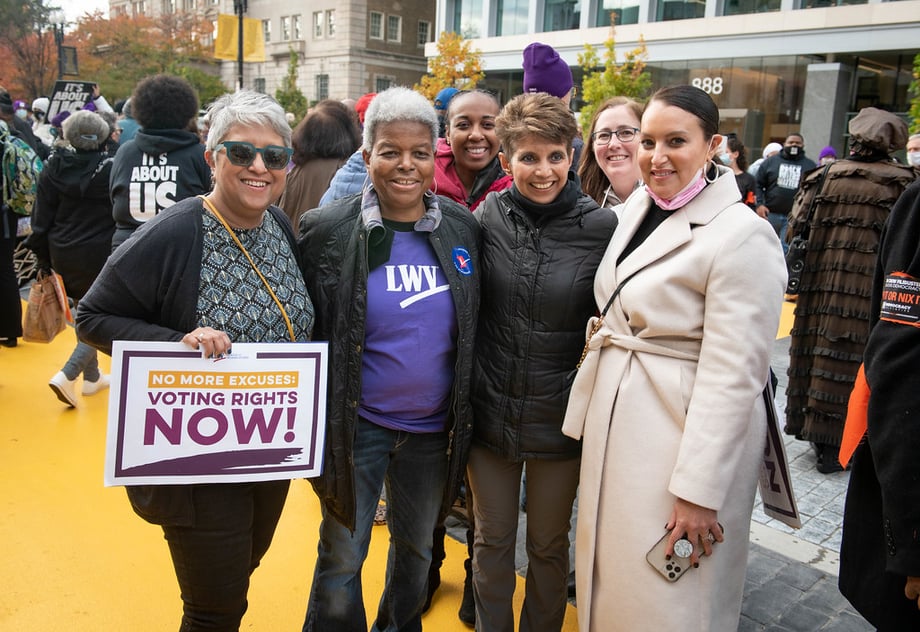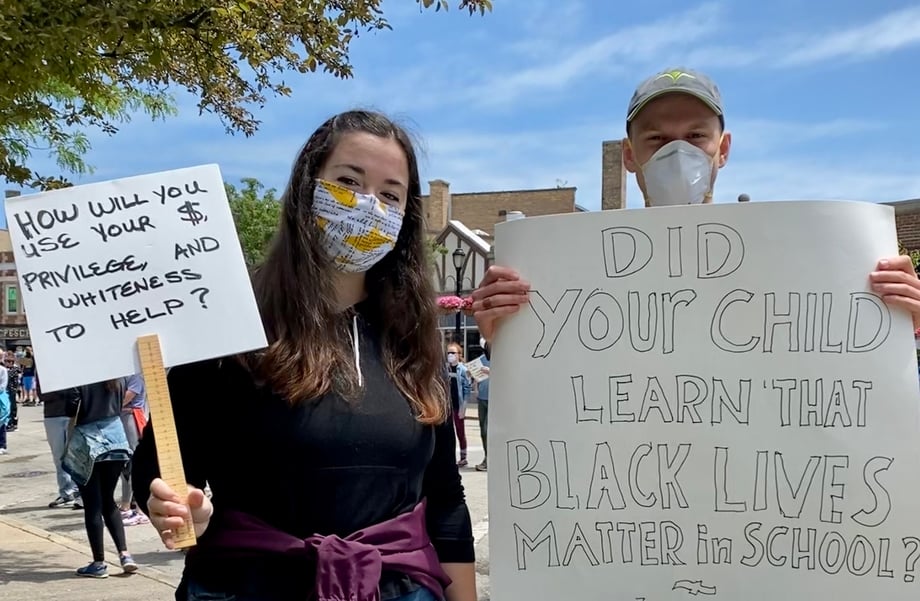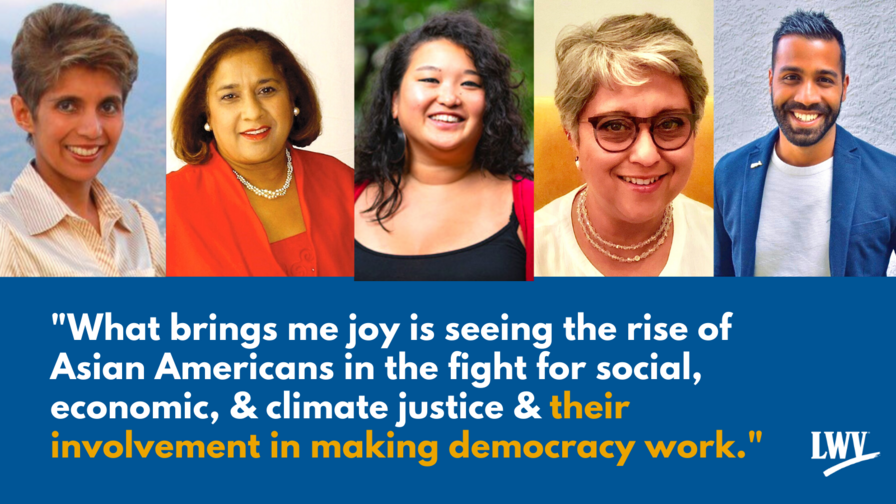Celebrating AAPI Heritage Month with Team LWV!
On May 7, 1843, the US's first Japanese immigrants (on record, at least) stepped onto American soil. Over a century later, the day was deemed a national observance in honor of Asian American and Pacific Islander (AAPI) communities. From there, it became a week-long observance and then grew to encompass the full month of May.
The stories of our AAPI friends, colleagues, neighbors, and family are far richer and more nuanced than any blog or day of observance can convey. With this in mind, we're excited to highlight some of the accomplishments, advice, and experiences of our fellow Leaguers who identify as members of the AAPI community. As you'll see, each of these five people has had an enormous, positive impact on the League, our democracy, and the people around them.
What work do you do for the League, and what brought you here?
Adena Ishii: I'm the Voter Services Director for the Berkeley, Albany, Emeryville League. I'm also on the nominating committee slate for the California State League.
In 2019, I volunteered with the League as a student at Berkeley City College. As a student who left high school in the tenth grade, I never learned about our government in school. This hands-on experience has been instrumental to my personal development and ability to serve my community.
After transferring to UC Berkeley and graduating, I was awarded the Spirit of the League Award for my work engaging youth civically. Soon after, I was hired as a consultant to work on growing and diversifying our membership. This was 2016, so we had a surge of interest in politics and were able to grow our membership by over 50%.
I realized that the only way to truly diversify our organization and become more equitable and inclusive was to have more diverse leadership, so in 2017, I ran for president from the floor of our annual meeting. With 60% of the vote, I became the youngest and first woman of color to be president of our League.
Lali Watt: I serve on the board of LWV US and as a trustee for the LWV Education Fund. Over the years I have been a Communications Chair, Advocacy Chair, local League President, member of the State Board...the list goes on. In every role, I felt I was making a difference and never stopped learning new things.
Arif Nuri: I serve the League as our Major Gifts Officer. This work involves communicating with donors, highlighting our impact, and inviting anyone who believes in our mission to support the League.
I was raised by a fearless mother who hails from Meghalaya and Assam in India, two vibrantly matrilineal societies where women play a more significant role. These social norms were passed down to me, and they align phenomenally with the foundation and history of the League.
My passions for philanthropy also directly stem from my family, as we were the direct beneficiaries of donations and social services in our early years navigating the US. As I grew older, I came to realize the immense power of philanthropy to change communities for the better.
Dr. Sania Irwin: I serve on the Board of Directors of the League of Women Voters of the United States (LWVUS), and on the Board of Trustees of the League of Women Voters Education Fund (LWVEF). The League's work to empower every voter and defend our democracy is what drew me to them.
Pinny Sheoran: Around 1979 I joined the League in Cincinnati, Ohio at the urging of my graduate advisor, Dr. Mary Martin. She explained, “if you want to know about America, women’s rights, and democracy you should join the League.”
I am now the 2021-2022 President of the LWV of Metro Phoenix, and the President-elect of LWV of Arizona. I also serve as the State Advocacy chair providing leadership for action on LWV Arizona Legislative and Statewide policy priorities
What's an Accomplishment You're Really Proud Of?
Lali: Some years ago, we advocated for an increase in the minimum wage at the local level and, with a lot of hard work on the part of many community members, we succeeded! This made a real difference to many families.
I always like to picture the outcome in a very tangible way, like imagining parents serving more nutritious foods to their kids at the dinner table.

Sania: Rather than talk about accomplishments, I like to think in terms of impact. What energizes me is work towards a more equitable society, where diverse experiences and voices are respected and heard. Advancing that work through engagement with the League is very meaningful for me.
Arif: As my birthday is just around the corner, I have been reflecting on how much better I have become in advocating for myself this past year. I would hate for this to sound snarky, but I am continuing to learn how necessary it is to take care of myself before going all-in for others.
Adena: I’m really proud of the changes we have made in our League. Change can be challenging and painful; but now, we have a digital records system, active social media accounts, an internship program, more paid staff, a more diverse board, and a Diversity, Equity, Inclusion Team. I have been especially excited by all the younger members and members of color who have joined and worked with our League over the past few years.
Pinny: Personally, raising wonderful children committed to social and racial justice, who fight for equity through their work as educators and legal professionals. I am also very proud of staying focused on fighting for democracy, regardless of the obstacles or setbacks.
When you think about your heritage, what comes to mind? What brings you the most joy?
Pinny: One of the core tenets of the Hindu Faith is tolerance. This is the heritage I most cherish.
What brings me so much joy is seeing the rise of Asian Americans in the fight for social, economic, and climate justice and the expansion of their involvement in making democracy work. In almost every space where people fight for democracy, there are many people who share my heritage. This fills me with joy.
Arif: The sincere sense of gratitude and appreciation that is instilled in everything that I do. Also, our culture’s food brings me lots of joy. The Indian cuisine has something for everyone, and it is truly delicious (and spicy!).
Lali: My childhood memories of spending time with my grandparents and other relatives in our traditional, multi-generational family home in Kolkata, India have had a lasting impact.
Long summer mornings following my grandfather around and hot afternoons spent with my grandmother in rooms darkened by shutters, with the fan blowing humid air on us while she told us stories from the “Ramayana” and “Mahabharata,” are unforgettable.
Sania: One of my favorite holidays is the New Year’s celebration. Bangla Noboborsho is celebrated alongside the arrival of spring, with early morning concerts, and tasty pithas (traditional dumplings, both sweet and savory). The first day of a calendar year is rejuvenating, symbolizing a new beginning, irrespective of the corresponding calendar.
Adena: I am fourth-generation Japanese, Chinese, and Indian American. When I think about my heritage, I think about the culture, food, and holidays of my people. I think about how my family made sure to celebrate my heritage and instill a sense of pride in my sisters and me.
I also think about all that my family has overcome. My Japanese American family was unjustly incarcerated during World War II with roughly 120,000 other Japanese Americans. Despite this racist action, my grandfathers served in the Military Intelligence Service and the 442nd Regimental Combat Team, the segregated Japanese American battalion that distinguished itself as the most decorated unit for its size and length of service.
Other members of my family fought for Japanese American reparations and to ensure that this act by the government would never again be repeated. This is also part of my heritage, and I am so proud of the strength my ancestors have modeled for me.
Do you have advice or thoughts you’d share with AAPI youth who’re interested in pursuing a job like yours?
Lali: I am inspired by diaspora youth. They are making a huge difference in every aspect of our American life! I think I am more inclined to ask them for advice, truth be told!
Adena: Do work that impacts you and your community. It can be so empowering to serve your community, especially it feels like the news and national politics are overwhelming.
Also, celebrate organizations that are nonpartisan, like LWV. Nonpartisan means that we don't support or oppose any parties or candidates. The League still takes strong positions on many issues, and our nonpartisan status means that we can work together to accomplish more. In a time when people are focused on party politics, it can be liberating to focus on issues.
Sania: I am energized by both my professional career in the STEM fields and my passion for social justice. These are the places where I feel I can make an impact.
My advice to youth is to pursue what energizes you in the areas where you want to make an impact.
Arif: To work in the philanthropic sector is a phenomenal privilege and a profession that needs more people from our community. If you like traveling the world, meeting people from different walks of life, and creating significant impact in the non-profit, social justice-oriented, and mission-driven work we do, this is a career path to consider!
Pinny: Share your talents with Leagues who will use their resources to augment them, so jointly you can learn to lead and help make democracy work!
Is there anything else you’d like to add as you reflect on AAPI Heritage month?
Pinny: While the Asian Americans have suffered from hate, much of which is only now being acknowledged, AAPI communities will not only need to speak out for themselves but also for others.
This month is a celebration of the resilience of the AAPI communities, not only in terms of their great contributions to the growth of America but, this year particularly, in terms of the voices they’ve raised against hate. I hope we continue on this trajectory of getting louder and speaking out.

Adena: As I think about AAPI heritage month, I want to acknowledge folks in the AAPI community who are marginalized. We often think of Asian Americans as Japanese, Korean, Chinese, and Indian people, however, "AAPI" encompasses so many other languages, cultures, and traditions. There is strength in uniting against the racism that many of us face, but we are not a monolith. My adopted teen is Cambodian, and she has taught me a lot about the privilege I have as an Asian American of three cultures that are widely known.
I also want to acknowledge intersectionality. Just because we are celebrating our AAPI heritage does not mean that we don't have other identities. Shout-out to folks who identify as AAPI and are also mixed race, part of the LGBTQ+ community, and people with disabilities.
In regards to the hate crimes and violence that the AAPI community has been increasingly facing, it's important to remember that we are not responsible for the crimes against us. There are some who believe that we must work harder to be the model minority and not put targets on our backs. However, history has taught us that it doesn't matter how Americanized we become. Until we address the root causes of racism, AAPI folks will continue to be perpetual foreigners.
We should be working together with other communities for our collective success against hate. That means Black lives matter. That also means we need to look at the racism we face within our own families and cultures so we aren't part of the problem.
Lali: I dream of a day when we don't have to explain who we are and why we think and feel the way we do. A day when our norms are just accepted as American norms rather than something separate, different, or exotic.
Every culture brings something valuable to the table.
The Latest from the League
Asian American, Native Hawaiian, and Pacific Islander (AANHPI) women have always been an integral part of the voting rights movement. From opposing sexist and racist legislation to expanding the freedom to vote, the following five women are just a few of the many icons you should know about.
Kristy Drutman, also known as “Browngirl Green,” is a speaker, media producer, and environmental justice activist. She co-founded the Green Jobs Board, a digital platform to help folks around the country find jobs and resources in the environmental space.
The League of Women Voters grieves the murders of the eight individuals who were killed on Tuesday, March 16th, and the countless other AAPI lives that have been tragically taken as a result of racially motivated violence.
Sign Up For Email
Keep up with the League. Receive emails to your inbox!
Donate to support our work
to empower voters and defend democracy.





